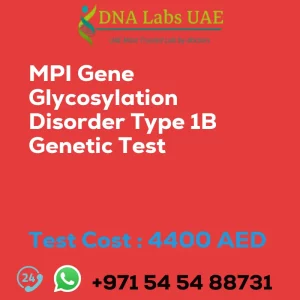B4GALT1 Gene Glycosylation Disorder Type 2D Genetic Test
Welcome to DNA Labs UAE, where we offer the B4GALT1 Gene Glycosylation Disorder Type 2D Genetic Test. This test is designed to identify mutations or variations in the B4GALT1 gene that may be causing the disorder.
Test Components
Price: 4400.0 AED
Sample Condition
Blood or Extracted DNA or One drop Blood on FTA Card
Report Delivery
3 to 4 Weeks
Method
NGS Technology
Test Type
Metabolic Disorders
Doctor
General Physician
Test Department
Genetics
Pre Test Information
Clinical History of Patient who is going for B4GALT1 Gene Glycosylation Disorder Type 2D NGS Genetic DNA Test. A Genetic Counselling session to draw a pedigree chart of family members affected with Glycosylation Disorder Type 2D.
Test Details
The B4GALT1 gene is responsible for encoding an enzyme called beta-1,4-galactosyltransferase, which plays a crucial role in the process of glycosylation. Glycosylation is the attachment of sugar molecules to proteins and lipids, and it is essential for the proper functioning of many biological processes.
A mutation in the B4GALT1 gene can lead to a glycosylation disorder known as type 2D, also called congenital disorder of glycosylation type 2D (CDG2D). This disorder is characterized by a range of symptoms that can vary in severity, including developmental delays, intellectual disability, seizures, abnormal facial features, skeletal abnormalities, and other organ system involvement.
NGS (Next-Generation Sequencing) genetic testing is a method used to analyze the DNA sequence of an individual. In the context of B4GALT1 gene glycosylation disorder type 2D, NGS genetic testing can be performed to identify any mutations or variations in the B4GALT1 gene that may be causing the disorder.
NGS genetic testing involves sequencing the DNA of the individual using advanced sequencing technologies. This allows for the simultaneous analysis of multiple genes, including the B4GALT1 gene, in a single test. The test can detect various types of genetic alterations, such as single nucleotide variants (SNVs), insertions, deletions, and other structural variations.
By identifying specific mutations or variations in the B4GALT1 gene, NGS genetic testing can provide a definitive diagnosis for individuals suspected of having type 2D glycosylation disorder. This information can help guide medical management and treatment decisions, as well as provide important information for genetic counseling and family planning.
| Test Name | B4GALT1 Gene Glycosylation disorder type 2D Genetic Test |
|---|---|
| Components | |
| Price | 4400.0 AED |
| Sample Condition | Blood or Extracted DNA or One drop Blood on FTA Card |
| Report Delivery | 3 to 4 Weeks |
| Method | NGS Technology |
| Test type | Metabolic Disorders |
| Doctor | General Physician |
| Test Department: | Genetics |
| Pre Test Information | Clinical History of Patient who is going for B4GALT1 Gene Glycosylation disorder type 2D NGS Genetic DNA Test A Genetic Counselling session to draw a pedigree chart of family members affected with Glycosylation disorder type 2D |
| Test Details |
The B4GALT1 gene is responsible for encoding an enzyme called beta-1,4-galactosyltransferase, which plays a crucial role in the process of glycosylation. Glycosylation is the attachment of sugar molecules to proteins and lipids, and it is essential for the proper functioning of many biological processes. A mutation in the B4GALT1 gene can lead to a glycosylation disorder known as type 2D, also called congenital disorder of glycosylation type 2D (CDG2D). This disorder is characterized by a range of symptoms that can vary in severity, including developmental delays, intellectual disability, seizures, abnormal facial features, skeletal abnormalities, and other organ system involvement. NGS (Next-Generation Sequencing) genetic testing is a method used to analyze the DNA sequence of an individual. In the context of B4GALT1 gene glycosylation disorder type 2D, NGS genetic testing can be performed to identify any mutations or variations in the B4GALT1 gene that may be causing the disorder. NGS genetic testing involves sequencing the DNA of the individual using advanced sequencing technologies. This allows for the simultaneous analysis of multiple genes, including the B4GALT1 gene, in a single test. The test can detect various types of genetic alterations, such as single nucleotide variants (SNVs), insertions, deletions, and other structural variations. By identifying specific mutations or variations in the B4GALT1 gene, NGS genetic testing can provide a definitive diagnosis for individuals suspected of having type 2D glycosylation disorder. This information can help guide medical management and treatment decisions, as well as provide important information for genetic counseling and family planning. |








